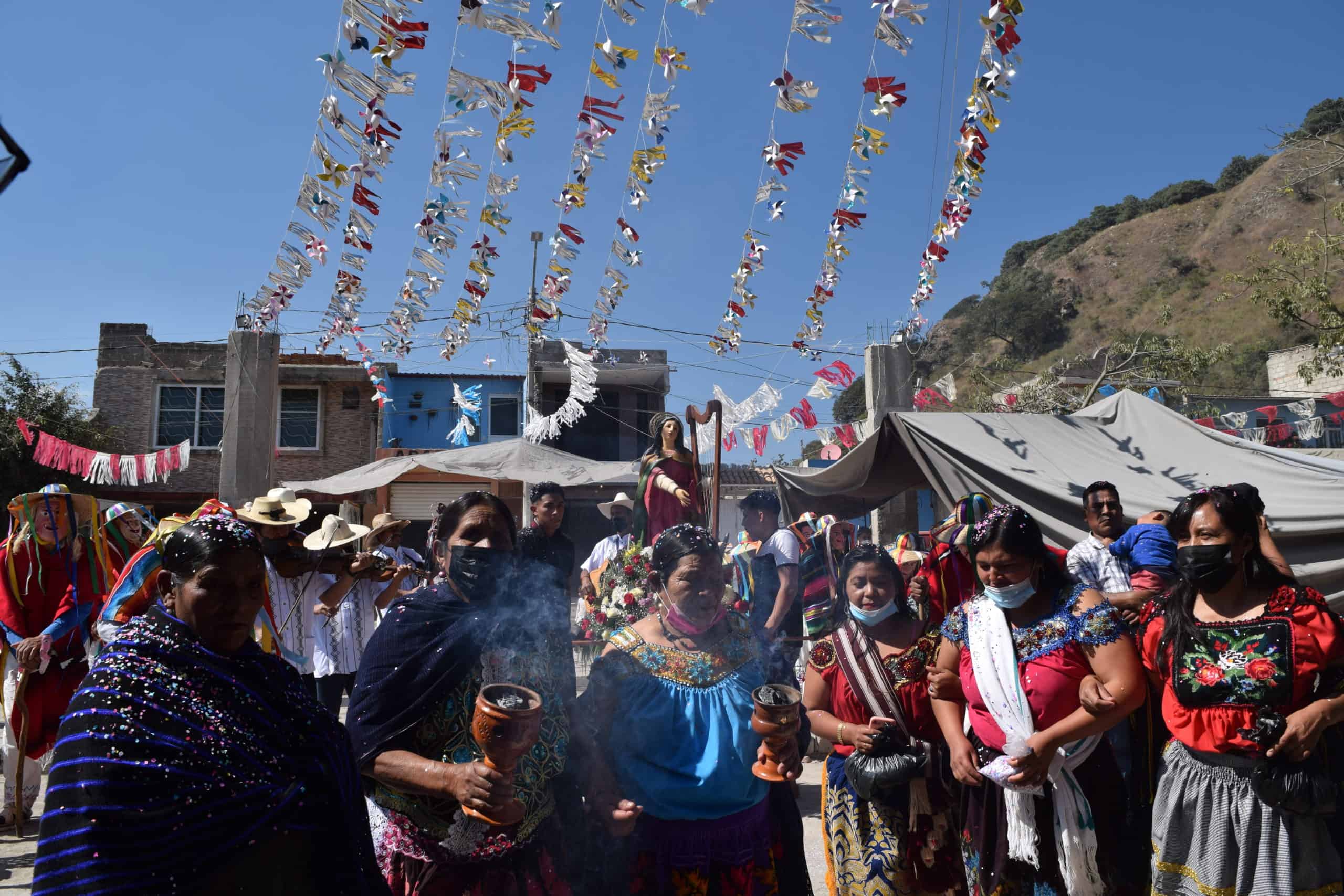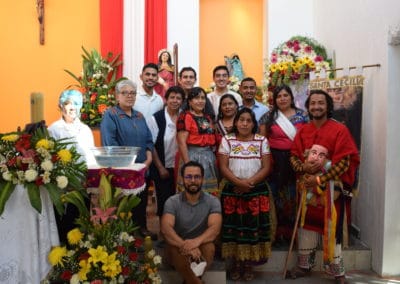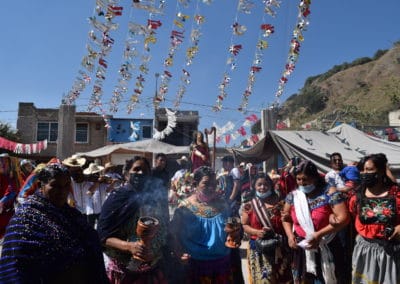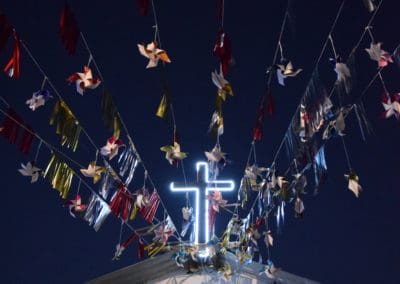When I first arrived in Guadalajara for a period of university study as a newly vowed Jesuit, I was missioned to work with the Purépecha people, an indigenous tribe from Mexico.The first time I stepped foot in the Purépecha neighborhood, it felt like I was stepping into an alternate reality. The houses were small, touching each other, leaving no room for yards. Many were unfinished, bare cinder blocks, leaving rooms exposed to those walking by, blurring the line between in and out. Large families were squeezed into small spaces, some families even choosing to sacrifice precious space to run a small neighborhood store from their living room or garage. Like many homes on the periphery of Guadalajara, it was hard to tell if there was more dirt inside or outside; the unpaved roads and the strong wind making cleaning a constant battle.
But something was different. The people were different. Although certain aspects of the neighborhood looked similar to the neighborhood where I live, the culture of the Purépecha people made everything feel different. As a new person, every gesture and look of mine was watched, so I concentrated on not offending someone with a misplaced word or gesture. Finding myself in a very unfamiliar culture, I felt anxiety rising in my stomach as I dealt with my uncertainty in this new reality. In that moment, I was forced to confront my fear of change and my desire for comfort in the face of uncertainty. Facing the fear of new and uncertain situations required that I rely on my companion, Jesus, as a source of strength. In these experiences, I am moved to question, but also to deepen my own vocation, asking, “Lord, to whom shall we go?” (Jn 6, 68) God’s answer is simple, to me, and with me, to the people in need of our world.
Why is it that when we lift our eyes to the sky, searching for answers, we are often directed back to Earth? Seeking refuge above, God pushes me towards the world in all its complexity, reminding me that God is present everywhere, I just have to notice. How can we walk closely with Jesus if we barely know Him? I, as a member of a larger team comprising five other Jesuits and four nuns of the Society of Mary, have found what we believe is the answer to this question. We walk closely with Jesus by serving those Jesus chose to serve.
The Purépecha people, an indigenous Mexican tribe, began to move many years ago from their native lands to the peripheries of Guadalajara in search of opportunity. Expecting better futures, they have instead been met with increasing violence, exclusion and isolation, their limited Spanish leaves them often unable to adapt to a new world and at a greater risk to be preyed upon by those who see them as an opportunity instead of humans. Working with these people, as they overcome enormous hurdles to simply survive, has shown me an example of faith that is much bigger than any problem. When Florencio, a beloved member of the community passed away last year, many of his family and friends shared what little they had to pay his funeral expenses as a sign of solidarity to Hilda, his widow. Their sacrifice was a strong reminder of why God chose to become incarnate among the poor: their open and generous hearts. Their faith that there would be enough, even when there was so little, was more powerful than their fear of going without. Their desire to share and care for a hurting member of their community was a taste of the Kingdom of God.
Witnessing the Kingdom of God at hand in His dearest and most beloved friends, the poor and outcast, has taught me to open my heart and learn to search for and experience God’s presence as the Purépecha people do, in small and uncommon activities such as spending Sundays, their day off, working on Saint Cecilia, the small chapel, where they celebrate faith as a big community with prayers, music and dances on the saint’s feast day.
This festivity highlights the faith and devotion of the Purépecha. Despite their limited means, the small neighborhood chapel is freshly painted and decorated, and the streets of the neighborhood are lined with thousands of colorful flowers and flags. The freshly painted and ornate chapel contrasts with the dusty neighborhood and the flowers and flags look odd among the unfinished houses. Many families spend a significant amount of money on fireworks for the three-day celebration and parents and grandparents beam with pride when they see teenagers wear their typical, handcrafted costumes as they dance in procession in the street. Days before the celebration actually starts, carnival rides begin appearing in the empty lot next to the chapel, giving the neighborhood a fair-like atmosphere. This celebration is a time of community and of joy in the face of so much suffering.
These last three years with the Purépechas have shown me that sometimes my desire to serve in tangible, measurable ways actually leaves these brothers and sisters of mine unserved. While I expect to create change, improve lives, and create opportunities, they most often desire presence. They just want me to sit with them, to listen to what is happening inside them, and to share their triumphs and sorrows. Knowing that Purépechas often feel rejected by those outside their immediate community, when they call or text me, I understand that they are asking for help. A message may say, “come to my house to have a coffee,” but what it means is, “I need you to listen to me, nothing else but this.” Building the Kingdom of God, with these my sisters and brothers, requires a different kind of construction. This is a different kind of waiting, working, and resting together, sharing in joys and sorrows, a being, more than a doing.
These small, often seemingly unimportant, experiences make sense after taking them to a poor and abandoned Jesus in prayer. I understand that my vocation of service implies giving myself fully to those His Son cared most about, the poor, and remaining close to these people has meant remaining close to Jesus and to His Father. After spending time listening and sharing, I have become part of their lives. I have learned to listen to what is not said, as much as what is said, to hear requests in the non-asking and to grow in empathy for these members of my family. I have come to recognize that I want to remain here, with Jesus, sharing my life with the poor, as Jesus chose to do.
This is the mission all Christians have been tasked with, to learn how to see, not with our physical eyes, but with the eyes of our heart, to ask where God would like us to go, and when we find that place, to love as Christ did. Let us ask God to place us next to the poor, His poor, and to make us able to give our life to them.
-//-
Photos courtesy of the author.





